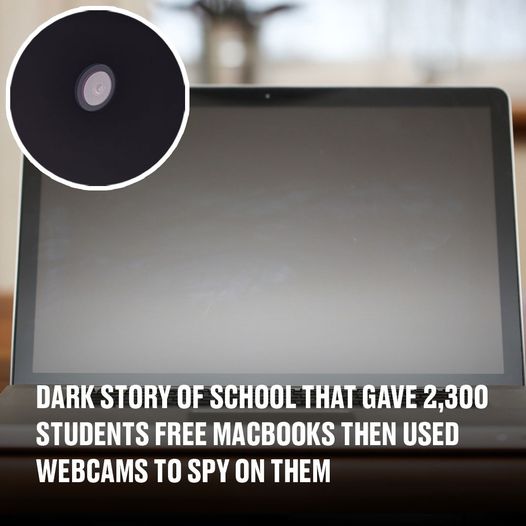In a case that feels ripped from the script of a dystopian TV show, a Pennsylvania school district found itself in the middle of a massive scandal. Back in 2010, the Lower Merion School District was accused of spying on its students. This was orchestrated by using webcams installed on school-issued laptops. The incident, which became known as ‘WebcamGate,’ shocked the nation and led to a high-profile lawsuit. One that exposed the school’s disturbing invasion of privacy.
The Origins of ‘WebcamGate’

At the start of the 2009-2010 school year, the Lower Merion School District rolled out a program that provided 2,300 students with free MacBooks. These laptops were meant to be used at home and in school as part of a broader initiative funded by education grants. Unbeknownst to the students, however, these devices came preloaded with tracking software called Theft Track. This software was designed to deter theft by allowing the school to monitor the whereabouts of the laptops.
What the students didn’t know was that this software enabled school officials to do much more than just track the location of the laptops. They could also remotely activate the webcams. Allowing them to spy on students in their homes without their consent or knowledge.
The Discovery That Sparked Outrage

The school district’s covert activities were finally exposed in late 2009 when sophomore Blake J. Robbins discovered that his laptop’s webcam had been secretly activated. Robbins, a student at Harriton High School, was called into the vice principal’s office and accused of engaging in illegal drug activity. The school presented covertly captured webcam images as “proof” of his wrongdoing.
Robbins vehemently denied the accusation, calling it “completely false.” Disturbed by the invasion of privacy, Robbins shared the information with his parents, who then decided to take legal action. The Robbins family filed a lawsuit on behalf of all students who the school had issued laptops.
Another Victim Comes Forward

As the case gained traction, another student, Jalil Hasan, also filed a complaint. Hasan, who was 17 at the time, had been monitored via his webcam for two months without his knowledge. His family, like Robbins’, was outraged by the violation of privacy, adding fuel to the fire of what would become a major lawsuit against the school district.
The Lawsuit and Settlement

The lawsuit, known as Robbins v. Lower Merion School District, was settled in October 2010. The school district agreed to pay a total of $610,000 to settle both the Robbins and Hasan cases. Of this amount, $175,000 and $10,000 were placed in trusts for Robbins and Hasan, respectively, while the rest went to cover legal fees.
School District Issues Statement

The Lower Merion School District issued a lengthy statement in response to the lawsuit. One in which they acknowledged the settlement and addressed the public’s concerns. The district stated, “We believe this settlement enables us to move forward in a way that is most sensitive to our students, taxpayers, and the entire school district community.”
The statement also emphasized that the U.S. Attorney’s Office, the FBI, and the Montgomery County District Attorney had cleared the district of any criminal wrongdoing. “That was an important moment for us. It confirmed the results of an independent investigation and the District’s initial findings.”
A Violation of Trust

The settlement may have ended the legal battle, but the case raised serious questions about the use of technology in schools and the lengths to which institutions might go to monitor students. The district’s actions were seen as a gross violation of trust. Many parents and students were left feeling betrayed by the very people who were supposed to be protecting them.
Robbins, who became the face of the case, expressed his disbelief over the webcam ordeal. “It’s shocking to think that the people responsible for our education were also invading our privacy in such a personal way,” he said in an interview following the settlement.
The Broader Implications

The WebcamGate scandal highlighted the darker side of technology in education. While laptops and other devices can enhance learning, they also come with the potential for abuse if not properly regulated. The case became a cautionary tale for schools across the country, prompting many to reevaluate their policies on digital monitoring and privacy.
“This case was a wake-up call for many institutions,” said privacy advocate Sarah Montgomery. “It showed us that we need to be vigilant about the tools we put in the hands of students and ensure that they are being used responsibly.”
Legal and Ethical Questions

Even after the settlement, many legal and ethical questions remained unanswered. Should schools have the authority to monitor students outside of school hours? What safeguards should be in place to prevent this kind of webcam abuse from happening again?
“It’s not just about the technology—it’s about the intent behind its use,” Montgomery continued. “We need to create laws that protect students’ rights to privacy while also allowing schools to ensure the safety of their equipment.”
Moving Forward

The Lower Merion School District revised its policies in the wake of the webcam scandal, pledging to prioritize the privacy of students and staff. In its final statement, the district stressed the importance of moving forward. “We revised our policies and procedures and reaffirmed our commitment to technology. We also put safeguards into place to ensure the privacy of our students, staff, and school families.”
As technology continues to evolve and become even more integrated into education, the lessons learned from WebcamGate will likely resonate for years to come. For many, it remains a chilling reminder of how easily privacy can be invaded. AND how vital it is to protect it.
